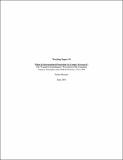When Is International Protection No Longer Necessary? The "Ceased Circumstances" Provisions of the Cessation Clauses: Principles and UNHCR Practice, 1973-1999
Author(s)
Bonoan, Rafael
Download8_cessation.pdf (313.1Kb)
Metadata
Show full item recordAbstract
The challenges posed by situations of mass influx and protracted refugee emergencies have prompted a reexamination of the international asylum regime established by the 1951 Convention and subsequent instruments. This has included increasing attention to the cessation clauses of the 1951 Convention and Statute of the Office of the High Commissioner for Refugees. The cessation clauses establish the linkage between the duration of international protection and the basis for recognition of refugee status. To some, the clauses therefore appear to be a potentially useful method of ensuring that international protection is reserved for those who truly need it.
Date issued
2001-06Publisher
Inter-University Committee on International Migration
Series/Report no.
Rosemarie Rogers Working Paper Series;8